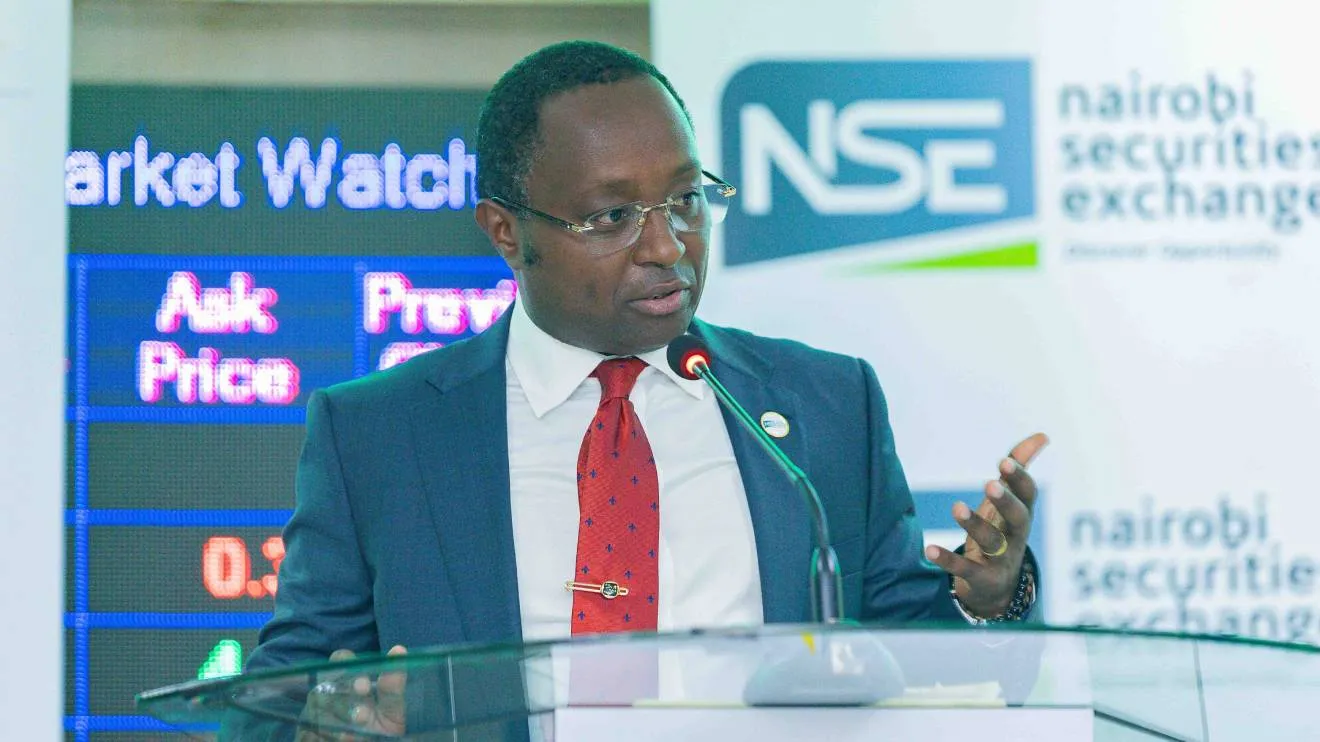The Nairobi Securities Exchange (NSE) is set to usher in a new era of accessibility for Kenyan investors, effective August 1, 2025. In a landmark move, the NSE has received regulatory approval to abolish the long-standing mandatory 100-share minimum trading rule, allowing individuals to buy and sell as little as one share. This pivotal change, cleared by the Capital Markets Authority (CMA), is poised to significantly dismantle entry barriers for retail investors and deepen the country’s capital markets.
“We listened and acted. You can now buy a single share of stock at the NSE PLC starting 1st August 2025. Stocks will now trade in multiples of one – phasing out the Odd Lot Board. Also, closing prices will only count if ≥100 shares trade in a session. Welcome to the era of a more inclusive NSE,” announced NSE Chief Executive Frank Mwiti on X, signaling the exchange’s commitment to democratizing investment opportunities. This development is not merely a procedural adjustment but a strategic stride towards aligning Kenya’s financial landscape with global best practices and national financial inclusion objectives.
Dismantling Barriers: The End of the 100-Share Rule
For decades, the 100-share minimum trading rule acted as a significant hurdle for many aspiring retail investors in Kenya. This regulation meant that to participate in the stock market, an individual had to commit a minimum capital outlay equivalent to the price of 100 shares of a particular company, plus associated trading fees. For highly-priced stocks, this could translate into a substantial sum, effectively sidelining a large segment of the population with limited disposable income.
Historically, such minimum trading rules were often implemented to streamline trading processes, reduce administrative overhead for brokers, and ensure a certain level of liquidity in the market by encouraging larger block trades. However, in an increasingly digital and inclusive financial world, these rules became anachronistic, serving more as an impediment than a facilitator of market participation. The existence of an “Odd Lot Board” was a workaround for trades involving fewer than 100 shares, but it often came with less favorable pricing and lower liquidity, making it less attractive for small investors.
The decision by the Capital Markets Authority (CMA) to clear amendments to the Equity Trading Rules marks a progressive shift. By enabling securities to trade in units of one, the NSE is directly addressing the financial accessibility challenge. This means that an individual interested in owning a piece of a blue-chip company, regardless of its share price, can now do so with a much smaller investment, potentially as low as a few shillings.
A More Inclusive NSE: Impact on Retail Investors
The direct beneficiaries of this policy change are undoubtedly the retail investors, particularly those who previously found the stock market intimidating or financially out of reach.
Lowering the Entry Barrier
The most immediate and profound impact is the dramatic reduction in the capital required to start investing. For instance, if a stock trades at KES 100, a retail investor previously needed KES 10,000 (100 shares x KES 100) to make a purchase. Now, that same investor can buy a single share for just KES 100. This makes stock market participation feasible for a much broader demographic, including students, young professionals, and individuals in lower-income brackets. It democratizes access to wealth creation opportunities that were once largely reserved for those with significant capital.
Fostering Increased Participation
Kenya’s financial inclusion agenda is a national policy objective, aiming to ensure that individuals and businesses have access to and use affordable financial products and services. Despite significant strides in other areas of financial inclusion, such as mobile money, participation in the capital markets has remained relatively low. As of December 2023, only 1.77 million investor accounts were active at the Central Depository and Settlement Corporation (CDSC), representing a mere fraction of the country’s approximately 50 million population, according to the Kenya Financial Stability Report 2023.
By eliminating the 100-share threshold, the NSE aims to significantly increase this participation rate. It opens the door for millions of Kenyans to become direct owners of publicly traded companies, fostering a sense of ownership in the national economy and allowing them to benefit from corporate growth and dividend payouts. This move aligns perfectly with the broader goals of financial empowerment and economic democratization.
Enhanced Diversification Opportunities
For small investors, diversification has always been a challenge. With limited capital, buying 100 shares of multiple companies to spread risk was often impossible. The new rule changes this. An investor with, say, KES 1,000, can now buy a single share in ten different companies, or even fractions of more expensive stocks if such mechanisms are eventually introduced. This ability to diversify a portfolio, even with modest sums, is crucial for mitigating risk and building a more resilient investment strategy. It allows investors to spread their capital across various sectors, reducing their exposure to the performance of any single company or industry.
Promoting Financial Literacy and Education
While easier access is a critical step, it must be complemented by robust financial literacy initiatives. As more Kenyans enter the stock market, there will be an increased need for education on investment principles, risk management, market dynamics, and the importance of long-term investing versus speculative trading. The NSE, CMA, and market intermediaries will likely intensify their efforts to provide accessible and comprehensive investor education programs to ensure that new participants make informed decisions.
Deepening Liquidity and Market Efficiency
The impact of this rule change extends beyond individual investors to the overall health and functionality of the Nairobi Securities Exchange itself.
Increased Market Liquidity
When more participants can trade in smaller increments, the total volume of shares traded on the exchange tends to increase. This leads to deeper market liquidity, meaning there are more buyers and sellers at any given time, making it easier for investors to enter or exit positions without significantly impacting prices. Higher liquidity reduces transaction costs and makes the market more attractive for both retail and institutional investors.
Improved Price Discovery
With a wider range of participants and more frequent, smaller trades, the market’s ability to accurately reflect the true value of securities improves. This enhanced “price discovery” means that stock prices are more likely to reflect all available information, leading to a more efficient and fair market. The phasing out of the Odd Lot Board, which often saw trades executed at prices different from the main board, will further contribute to a more unified and transparent pricing mechanism.
Clarification on Closing Prices
The NSE has also clarified that “closing prices will only count if ≥100 shares trade in a session.” This is an important detail designed to maintain market integrity and prevent manipulation. If only a few shares were traded at an outlier price, it could distort the official closing price, which is used for valuation, performance tracking, and various financial calculations. By requiring a minimum volume of 100 shares for a closing price to be considered valid, the NSE ensures that the reported closing price is representative of substantial market activity, providing a more reliable benchmark for investors. If fewer than 100 shares are traded, the previous day’s average price will be retained as the closing value, offering stability and preventing artificial volatility based on minimal trading.
Aligning with Global Trends: Democratizing Capital Markets
The NSE’s move is part of a broader global trend towards democratizing capital markets. In many developed markets, the concept of fractional share ownership has gained significant traction. Platforms in the US and Europe, for example, allow investors to buy a tiny fraction of a single share of even the most expensive companies like Amazon or Google. This has fundamentally changed how retail investors engage with the stock market, making investing more accessible and flexible.
While the NSE’s initial step is to allow trading in units of one (whole shares), it lays the groundwork for potential future advancements, such as fractional share trading, which would further expand accessibility. This progressive approach positions the NSE as a forward-thinking exchange in Africa, keen on adopting innovations that foster broader participation and enhance market efficiency. By embracing these global trends, Kenya strengthens its appeal as a modern and inclusive financial hub.
Expanding Horizons: The Satrix MSCI World Feeder ETF Listing
Adding another layer of sophistication and opportunity to the NSE, the dual listing of the Satrix MSCI World Feeder Exchange-Traded Fund (ETF) on the exchange is a significant development. Originally listed on the Johannesburg Stock Exchange (JSE), this ETF offers Kenyan investors unprecedented access to global markets.
Understanding ETFs and Feeder ETFs
An Exchange-Traded Fund (ETF) is a type of investment fund that trades on stock exchanges, much like a regular stock. ETFs typically hold assets like stocks, commodities, or bonds and aim to track the performance of a specific index. A “feeder ETF,” as in this case, invests primarily in another underlying ETF (the “master ETF”) rather than directly in the underlying securities. This structure allows for efficient access to broader markets or specific investment strategies.
Accessing the MSCI World Index
The Satrix MSCI World Feeder ETF tracks the MSCI World Index, a widely recognized global equity index that captures large- and mid-cap representation across 23 developed market countries. This index includes over 1,300 firms, offering investors exposure to some of the world’s largest and most influential companies across diverse sectors.
For Kenyan investors, this means:
- Global Diversification: They can now easily diversify their portfolios beyond Kenyan companies, gaining exposure to international giants in technology, healthcare, finance, and other sectors. This reduces reliance on the performance of the local economy and market.
- Access to Developed Markets: Investing in the MSCI World Index provides a gateway to mature and stable economies, potentially offering different growth profiles and risk characteristics compared to emerging markets.
- Currency Hedging (Indirectly): While the ETF itself is listed in KES, exposure to global companies provides an indirect hedge against local currency fluctuations, as the underlying assets are denominated in various international currencies.
- Simplified International Investing: Instead of opening brokerage accounts in multiple countries or dealing with complex cross-border transactions, Kenyan investors can now gain global exposure through a single, locally listed instrument.
International Confidence in Kenya’s Financial Infrastructure
NSE Chair Kiprono Kittony rightly stated that this listing “reflects international confidence in Kenya’s financial infrastructure.” The decision by a prominent South African investment firm like Satrix (owned by Sanlam Group, a major financial services provider) to dual-list its global ETF on the NSE underscores Nairobi’s growing reputation as a reliable and sophisticated financial hub in East Africa. It signals to other international players that Kenya’s regulatory environment, market systems, and investor base are robust enough to support complex financial products. This, in turn, can attract further foreign direct investment and portfolio flows into the country.
Kenya’s Vision for Financial Inclusion and Economic Growth
These recent developments at the NSE are integral to Kenya’s broader national policy objective of financial inclusion. The government and regulatory bodies recognize that a vibrant and accessible financial sector is crucial for sustainable economic growth and poverty reduction.
Kenya has been a global leader in mobile money innovation, with platforms like M-Pesa revolutionizing financial access for millions. The expansion of capital market access is a logical next step in this journey, aiming to move individuals from basic transactional services to more sophisticated wealth-building opportunities.
By enabling more Kenyans to participate in the stock market, the NSE contributes to:
- Capital Formation: Increased retail participation can lead to greater capital mobilization for companies, allowing them to fund expansion, innovation, and job creation.
- Economic Empowerment: Direct investment in companies gives individuals a stake in the economy’s growth, fostering a sense of financial empowerment and self-reliance.
- Support for Local Businesses: A deeper and more liquid stock market makes it easier for Kenyan companies to raise capital through public offerings, supporting their growth and competitiveness.
- Regional Leadership: By adopting progressive policies and attracting international listings, the NSE reinforces Nairobi’s position as a leading financial center in East and Central Africa, potentially drawing in more cross-border investments and financial services expertise.
Challenges and the Path Ahead
While the outlook is overwhelmingly positive, the implementation of these changes and the broader growth of the capital markets will face certain challenges:
- Investor Education: The ease of access must be matched with comprehensive investor education to prevent uninformed decisions and potential losses, especially for first-time investors. The CMA and NSE will need to scale up their financial literacy campaigns.
- Market Volatility: Stock markets are inherently volatile. New investors need to understand the risks involved and be prepared for market fluctuations.
- Regulatory Oversight: With increased participation, the CMA will need to ensure robust regulatory oversight to protect investors from fraud and market manipulation.
- System Capacity: Trading systems and brokerage infrastructure must be robust enough to handle potentially increased transaction volumes and smaller trade sizes efficiently.
- Economic Performance: The sustained success of the NSE and investor confidence will ultimately depend on the broader performance of the Kenyan economy and the profitability of listed companies.
Despite these challenges, the direction is clear. The Nairobi Securities Exchange, with the support of the CMA and the broader financial ecosystem, is taking decisive steps to create a more inclusive, liquid, and internationally connected market.
Conclusion: A Transformative Moment for Kenya’s Financial Future
The Nairobi Securities Exchange’s decision to eliminate the 100-share minimum trading rule, coupled with the strategic dual-listing of the Satrix MSCI World Feeder ETF, marks a transformative moment for Kenya’s financial landscape. These moves are not just about technical adjustments; they are about fundamentally reshaping access to wealth creation for millions of Kenyans and elevating Nairobi’s standing as a regional financial powerhouse.
By embracing global best practices in market accessibility and offering diversified international investment opportunities, the NSE is demonstrating its commitment to fostering a vibrant, inclusive, and resilient capital market. As Frank Mwiti aptly put it, Kenya is entering “the era of a more inclusive NSE.” This inclusivity, combined with continued efforts in investor education and regulatory vigilance, promises to unlock new avenues for economic growth, capital formation, and financial empowerment for generations to come, solidifying Kenya’s position as a dynamic hub in Africa’s economic trajectory. The eyes of the continent, and indeed the global investment community, will be watching closely as this new chapter unfolds.
Ready to take your career to the next level? Join our dynamic courses: ACCA, HESI A2, ATI TEAS 7 , HESI EXIT , NCLEX – RN and NCLEX – PN, Financial Literacy!🌟 Dive into a world of opportunities and empower yourself for success. Explore more at Serrari Ed and start your exciting journey today! ✨
Photo source: Google
By: Montel Kamau
Serrari Financial Analyst
22nd July, 2025
Article, Financial and News Disclaimer
The Value of a Financial Advisor
While this article offers valuable insights, it is essential to recognize that personal finance can be highly complex and unique to each individual. A financial advisor provides professional expertise and personalized guidance to help you make well-informed decisions tailored to your specific circumstances and goals.
Beyond offering knowledge, a financial advisor serves as a trusted partner to help you stay disciplined, avoid common pitfalls, and remain focused on your long-term objectives. Their perspective and experience can complement your own efforts, enhancing your financial well-being and ensuring a more confident approach to managing your finances.
Disclaimer: This article is for informational purposes only and does not constitute financial advice. Readers are encouraged to consult a licensed financial advisor to obtain guidance specific to their financial situation.
Article and News Disclaimer
The information provided on www.serrarigroup.com is for general informational purposes only. While we strive to keep the information up to date and accurate, we make no representations or warranties of any kind, express or implied, about the completeness, accuracy, reliability, suitability, or availability with respect to the website or the information, products, services, or related graphics contained on the website for any purpose. Any reliance you place on such information is therefore strictly at your own risk.
www.serrarigroup.com is not responsible for any errors or omissions, or for the results obtained from the use of this information. All information on the website is provided on an as-is basis, with no guarantee of completeness, accuracy, timeliness, or of the results obtained from the use of this information, and without warranty of any kind, express or implied, including but not limited to warranties of performance, merchantability, and fitness for a particular purpose.
In no event will www.serrarigroup.com be liable to you or anyone else for any decision made or action taken in reliance on the information provided on the website or for any consequential, special, or similar damages, even if advised of the possibility of such damages.
The articles, news, and information presented on www.serrarigroup.com reflect the opinions of the respective authors and contributors and do not necessarily represent the views of the website or its management. Any views or opinions expressed are solely those of the individual authors and do not represent the website's views or opinions as a whole.
The content on www.serrarigroup.com may include links to external websites, which are provided for convenience and informational purposes only. We have no control over the nature, content, and availability of those sites. The inclusion of any links does not necessarily imply a recommendation or endorsement of the views expressed within them.
Every effort is made to keep the website up and running smoothly. However, www.serrarigroup.com takes no responsibility for, and will not be liable for, the website being temporarily unavailable due to technical issues beyond our control.
Please note that laws, regulations, and information can change rapidly, and we advise you to conduct further research and seek professional advice when necessary.
By using www.serrarigroup.com, you agree to this disclaimer and its terms. If you do not agree with this disclaimer, please do not use the website.
www.serrarigroup.com, reserves the right to update, modify, or remove any part of this disclaimer without prior notice. It is your responsibility to review this disclaimer periodically for changes.
Serrari Group 2025
















